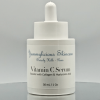Beauty Sleep Is Real
How Nighttime Cellular Regeneration Transforms Your Skin
There’s a reason they call it beauty sleep.
While you’re resting, your skin is hard at work — repairing damage, rebuilding collagen, and regenerating cells. Sleep is not just downtime for your mind — it’s prime time for your skin. And if you’ve ever woken up looking puffy, dull, or dry after a poor night’s sleep, your skin was sending you a message.
Let’s take a closer look at what actually happens overnight — and how you can make the most of this natural renewal process.
What Happens to Your Skin While You Sleep?
When night falls and your body slips into rest mode, your skin shifts gears. Several critical processes take place that contribute directly to a healthier, more youthful complexion:
Cellular Regeneration Peaks
Your skin cells divide and regenerate faster at night than during the day — particularly between 10 pm and 2 am1. This is when your skin replaces damaged cells with fresh new ones, reducing signs of aging, improving tone and texture, and maintaining skin elasticity.
Skin Becomes More Permeable
At night, your skin’s barrier becomes more relaxed. That means it loses moisture more easily — but also absorbs nutrients more effectively2. It’s an ideal time to use deeply nourishing, reparative products.
Inflammation and Stress Levels Drop
Cortisol (the stress hormone) decreases during sleep, which helps inflammation calm down. Meanwhile, melatonin — a powerful antioxidant — increases, helping your skin fight free radicals from the day3,4.
Your Skin Has a Circadian Rhythm
Just like your brain, liver, and hormones, your skin follows a biological clock. In the morning, it’s focused on defense: shielding you from UV rays, pollution, and stress. But in the evening, it turns inward — switching on repair and regeneration mode.
Research shows that certain genes involved in DNA repair, collagen synthesis, and cell renewal are upregulated at night5. This rhythm is why night creams are formulated differently than day creams — and why applying the right ingredients at the right time matters.
“Daytime is for protection. Nighttime is for renewal. Give your skin what it needs — when it needs it.”
Why Sleep Deprivation Ages You
Consistently missing sleep can visibly age your skin. Over time, poor sleep:
√ Slows down collagen production6
√ Increases signs of oxidative stress7
√ Leads to dullness, puffiness, and fine lines
√ Weakens the skin barrier, making skin more reactive8
In short, good sleep is one of the most overlooked anti-aging tools available — and it’s free.
Skincare Amplifies What Sleep Starts
While your skin does a lot of the work naturally, the right skincare can supercharge this process. A high-quality night cream supports skin renewal by replenishing moisture, delivering nutrients, and calming inflammation while you sleep.
The Yummylicious Approach: Stem Cell Night Cream
Our Stem Cell Night Cream was formulated with this nightly cycle in mind. It’s not just a moisturizer — it’s a treatment designed to work in harmony with your body’s biology.
What’s Inside:
√ Plant-Based Stem Cells & Peptides — Help enhance repair and maintain firmness
√ Collagen & Hyaluronic Acid — Deep hydration to plump skin and reduce fine lines
√ Botanical Extracts like Prickly Pear, Pomegranate & Seaweed — Soothing, vitamin-rich nourishment
√ Enzymes & Vitamins A, B, C, D, E, K — Support regeneration, brightness, and resilience
Each ingredient is carefully chosen to amplify the work your skin is already doing while you rest — giving you visible results by morning.
Night Is When You Heal
Skincare doesn’t need to be complicated — but it should be thoughtful. When you align your products with your body’s natural cycles, you get better results. Your skin already knows how to heal. We’re just here to support it.
References
1. Yaar, M., & Gilchrest, B. A. (2007). Aging of skin. In Fitzpatrick’s Dermatology in General Medicine. McGraw-Hill.
2. Lévêque, J.-L., & Rigal, J. (1983). Impaired barrier function in aging skin: measurement and consequences. Contact Dermatitis, 9(3), 223–228.
3. Hardeland, R. (2005). Antioxidative protection by melatonin: multiplicity of mechanisms from radical detoxification to radical avoidance. Endocrine, 27(2), 119–130.
4. Kim, K. E., Cho, D., & Park, H. J. (2016). Air pollution and skin diseases: Adverse effects of airborne particulate matter on various skin diseases. Life Sciences, 152, 126–134.
5. Geyfman, M., et al. (2012). Brain and skin: The interplay of circadian rhythms. Journal of Investigative Dermatology, 132(3 Pt 2), 854–861.
6. Oyetakin-White, P., et al. (2015). Does poor sleep quality affect skin aging? Clinical and Experimental Dermatology, 40(1), 17–22.
7. Dhabhar, F. S. (2009). Enhancing versus Suppressive Effects of Stress on Immune Function: Implications for Immunoprotection and Immunopathology. Neuroimmunomodulation, 16(5), 300–317.
8. Robinson, M., Visscher, M. O., Laruffa, A., & Wickett, R. R. (2010). Natural moisturizing factors (NMF) in the stratum corneum (SC). Journal of Cosmetic Dermatology, 9(2), 134–142.
Because your skin deserves the best!






